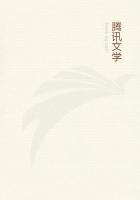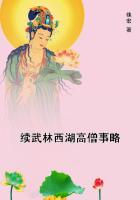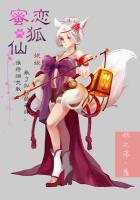"Jon and Loa lived with their father and mother far to the north of the Island of Fire, and when the children looked from their win-dows they saw only wild scaurs and jagged lava rocks, and a distant, deep gleam of the sea.They caught the shine of the sea through an eye-shaped opening in the rocks, and all the long night of winter it gleamed up at them, like the eye of a dead witch.But when it sparkled and began to laugh, the children danced about the hut and sang, for they knew the bright summer time was at hand.Then their father fished, and their mother was gay.
But it is true that even in the winter and the darkness they were happy, for they made fish-ing nets and baskets and cloth together, --Jon and Loa and their father and mother, --and the children were taught to read in the books, and were told the sagas, and given instruction in the part singing.
"They did not know there was such a thing as sorrow in the world, for no one had ever mentioned it to them.But one day their mother died.Then they had to learn how to keep the fire on the hearth, and to smoke the fish, and make the black coffee.And also they had to learn how to live when there is sorrow at the heart.
"They wept together at night for lack of their mother's kisses, and in the morning they were loath to rise because they could not see her face.The dead cold eye of the sea watching them from among the lava rocks made them afraid, so they hung a shawl over the window to keep it out.And the house, try as they would, did not look clean and cheerful as it had used to do when their mother sang and worked about it.
"One day, when a mist rested over the eye of the sea, like that which one beholds on the eyes of the blind, a greater sorrow came to them, for a stepmother crossed the thres-hold.She looked at Jon and Loa, and made complaint to their father that they were still very small and not likely to be of much use.
After that they had to rise earlier than ever, and to work as only those who have their growth should work, till their hearts cracked for weariness and shame.They had not much to eat, for their stepmother said she would trust to the gratitude of no other woman's child, and that she believed in lay-ing up against old age.So she put the few coins that came to the house in a strong box, and bought little food.Neither did she buy the children clothes, though those which their dear mother had made for them were so worn that the warp stood apart from the woof, and there were holes at the elbows and little warmth to be found in them anywhere.
"Moreover, the quilts on their beds were too short for their growing length, so that at night either their purple feet or their thin shoulders were uncovered, and they wept for the cold, and in the morning, when they crept into the larger room to build the fire, they were so stiff they could not stand straight, and there was pain at their joints.
"The wife scolded all the time, and her brow was like a storm sweeping down from the Northwest.There was no peace to be had in the house.The children might not repeat to each other the sagas their mother had taught them, nor try their part singing, nor make little doll cradles of rushes.Always they had to work, always they were scolded, always their clothes grew thinner.
"'Stepmother,' cried Loa one day, -- she whom her mother had called the little bird, -- 'we are a-cold because of our rags.Our mother would have woven blue cloth for us and made it into garments.'
"'Your mother is where she will weave no cloth!' said the stepmother, and she laughed many times.















